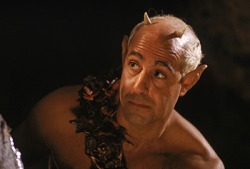In Elizabethan
Folklore, Puck is a household fairy who likes to play annoying tricks on
people, or, depending on his mood, helps them out with their chores (Shmoop Editorial Team, 2008).
Both, the
original and the mythological one are known for being mischievous. However, in
a Midsummer's Night Dream he is way more than a simple jester fairy. Puck is
not as ethereal as the other fairies in the play (who seem to live only for
themselves in a constant illusion). He is susceptible to misadventure and more
similar to a goblin than to a fairy. Actually,
one of the fairies describes Puck as a “hobgoblin” in Act 2, Scene 1.
As his
“hobgoblin” reputation suggests, Puck is fun-loving and thanks to this
mischievous nature, he sets in motion many of the play’s most memorable events,
becoming a really influential character in terms of the plot development and
outcomes of the play.
Puck can be
considered the soul of the play because he is the responsible of the Midsummer madness.
He turns the young lovers’ world upside down, sending them into chaos; but he
is also the one that helps restore the order and set things as they were
supposed to be (Hermia and Lysander, and Helena and Demetrius together in
love). And, for this same reason, he is the only character we can trust because
he is the only one with the credibility to tell us that he knows everything in
the play is a dream. He even promises that, if we did not like the play, he can
help us think it was all a dream:
“If we shadows
have offended,
Think but this,
and all is mended:
That you have
slumbered here
While these
visions did appear;
And this weak
and idle theme,
No more yielding
but a dream,
Gentles, do not
reprehend;
If you pardon,
we will mend.”
(Shakespeare’s A Midsummer’s Night Dream, Act 5, Scene
1)
So, what do you
think? How can a secondary character, that is not present in most of the play,
be regarded as the most important one? In my opinion, he is the most important
character of the play because without his mistakes and tricks, the plot will be
lost, senseless, and boring. Without him and his influence on every situation
of this play, A Midsummer’s Night Dream would not be a comedy (it would have
been more like a tragedy). Puck is the only one that can use magic to tie and
untie, deform and create as he pleases, and because of him, everything that
happened was magical as well. He is the one who restores the love balance
between the two couples: without him, the “happy ending” would have been
impossible.
References:
Jamieson, Lee. "Character Analysis – Puck, 'A
Midsummer Night's Dream'" About Education. Web. 9 Oct. 2014.
Markham, Samantha. "The Role of Puck in A
Midsummer Night's Dream." Suite. Web. 9 Oct. 2014.
Shakespeare, William. A
Midsummer's Night Dream. Ed. R.A. Foakes. Cambridge UP, 2003. Print.
Shmoop Editorial Team. "A Midsummer Night's
Dream." Shmoop.com . Shmoop University, Inc., 11 Nov.
2008. Web. 8 Oct. 2014.


No hay comentarios:
Publicar un comentario